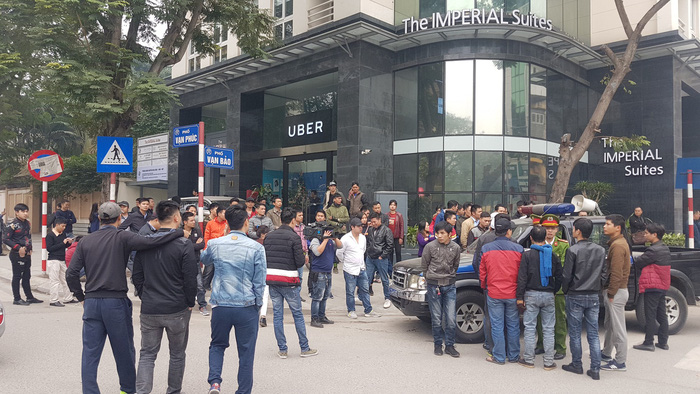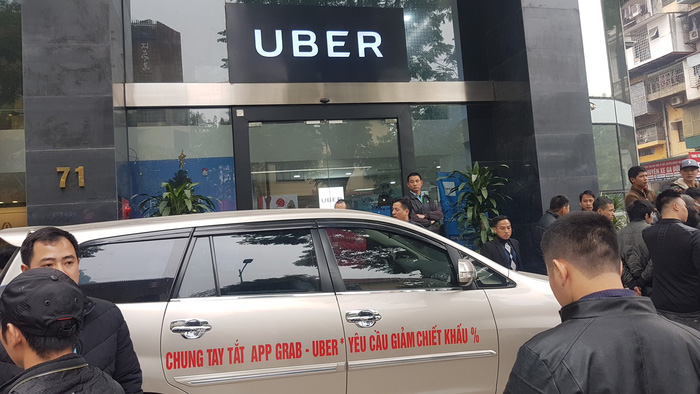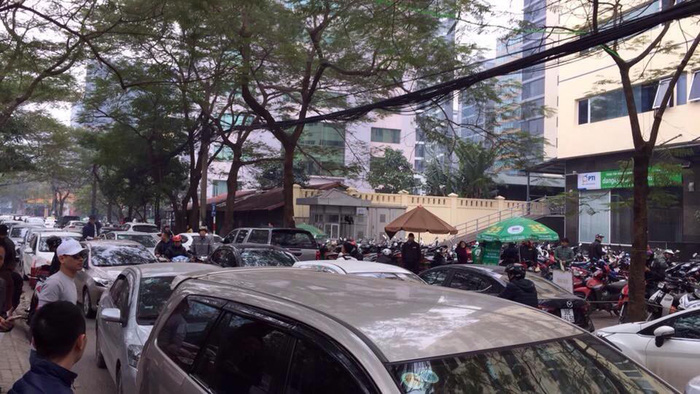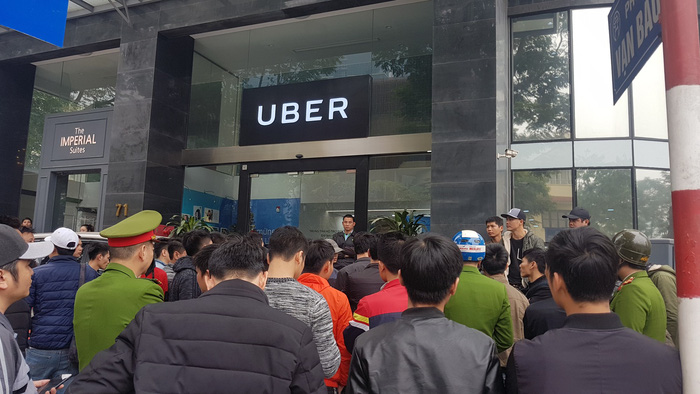Numerous Uber and Grab drivers in Hanoi besieged the separate offices of the ride-hailing apps on Monday to protest against their commission policies, apparently inspired by victory claimed by their peers in Ho Chi Minh City after a walkout last week.
Around 100 Uber drivers flocked to the app operator’s Hanoi office in Ba Dinh Strict around noon and demanded to talk to a representative.
One striking driver told Tuoi Tre (Youth) newspaper that Uber currently charges them 29.5 percent of the revenue earned from their rides.
According to the man, the commission ratio is too high and “causes difficulty for those who borrowed loans to buy cars in order to drive for Uber.”
The commission ratio used to be 15 percent for Uber drivers, before it went up to 20 percent and culminated at 25 percent.
The U.S.-based app additionally insisted that drivers ought to have an additional 4.5 percent deducted as personal income tax, sending the commission ratio to a whopping amount of 29.5 percent.
“We also have no idea whether the tax deduction would be refunded if it turns out our total monthly income is below the threshold to pay personal income tax,” the Uber driver told Tuoi Tre.
He added that all drivers merely wanted to have open talks with the company’s representatives but “they would not cooperate.”
Local police officers were deployed to the scene in order to ensure security and eventually requested the striking drivers to leave.
 |
| The police supervise the scene. Photo: Tuoi Tre |
By 2:30 pm, most of the drivers had left the scene, with only some staying to represent them in the dialogue with Uber representatives 30 minutes later.
During the talks, a driver named Hang, speaking on her coworkers’ behalf, demanded that Uber make it clear how the commission ratio is calculated, and suggested hiking the basic fares.
Hang said that the fares that Uber currently charges passengers are too low and only cause drivers to incur losses, given the complicated traffic in Hanoi, with many streets frequently suffering from gridlock and some roads even banning entry of Uber cars.
Hang added that Uber should not block drivers’ accounts based merely on feedback from passengers.
“The company should talk to drivers to address the complaint from both sides,” she said.
Ride-hailing apps usually apply low fares to attract customers and will enact disciplinary actions on drivers who receive negative feedback, made via the apps, from passengers. Drivers have no voice in those decisions.
 |
| A car is driven to the Uber office during a strike in Hanoi on January 15, 2018. Photo: Tuoi Tre |
Following these complaints, an Uber Vietnam spokesperson asserted that drivers play a crucial role in the company’s business, adding that the firm will work directly with them in order to address their concerns and find the best possible solutions for them.
Some drivers told Tuoi Tre that they will hire lawyers to protect their rights and represent their interests in the upcoming dialogues with Uber.
Simultaneously, the taxi-like GrabCar and motorbike taxi GrabBike drivers also went on strike at the Hanoi office of Grab Vietnam in Cau Giay District on Monday morning, asking for a lower commission ratio.
Grab drivers in the capital currently have to split 20 percent of their revenue per ride with the company and want to cut it to 15 percent.
The walkout blocked traffic on Duy Tan Street for a couple of hours. The crowd of striking drivers parted around 11:00 am, when some of they were invited to meet Grab representatives.
On January 1, Grab Vietnam increased the commission ratio from 20 percent to 23.6 percent, explaining that the additional 3.6 percent was personal income tax deduction on the drivers’ behalf.
The decision angered GrabBike drivers in Ho Chi Minh City, who staged a protest on January 10, pressuring Grab Vietnam to withdraw the decision three days later.
Even when the commission ratio had been reverted to 20 percent, GrabBike drivers in Hanoi believed it should be cut further to 15 percent.
 |
| Many drivers besiege the Grab office during a strike in Hanoi on January 15, 2018. Photo: Tuoi Tre |
Uber and Grab both began operating in Vietnam in 2014, launching in Hanoi and Ho Chi Minh City before expanding to other regions.
While the apps have won customers over with low fares, both companies experienced struggles in their relationships with their drivers, whom they recently referred to as ‘partners.'
Drivers for both apps complain that the dirt cheap fares set by the companies make the business less profitable, adding that they also have to cover other expenses, such as mobile phone and 3G data plans, and vehicle maintenance.
Like us on Facebook or follow us on Twitter to get the latest news about Vietnam!





















































